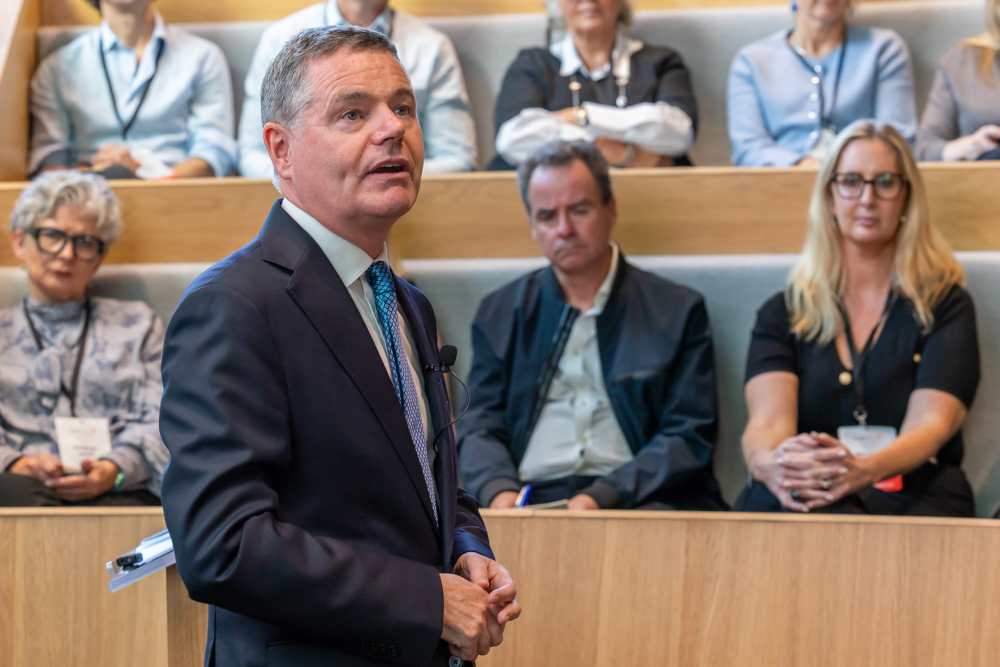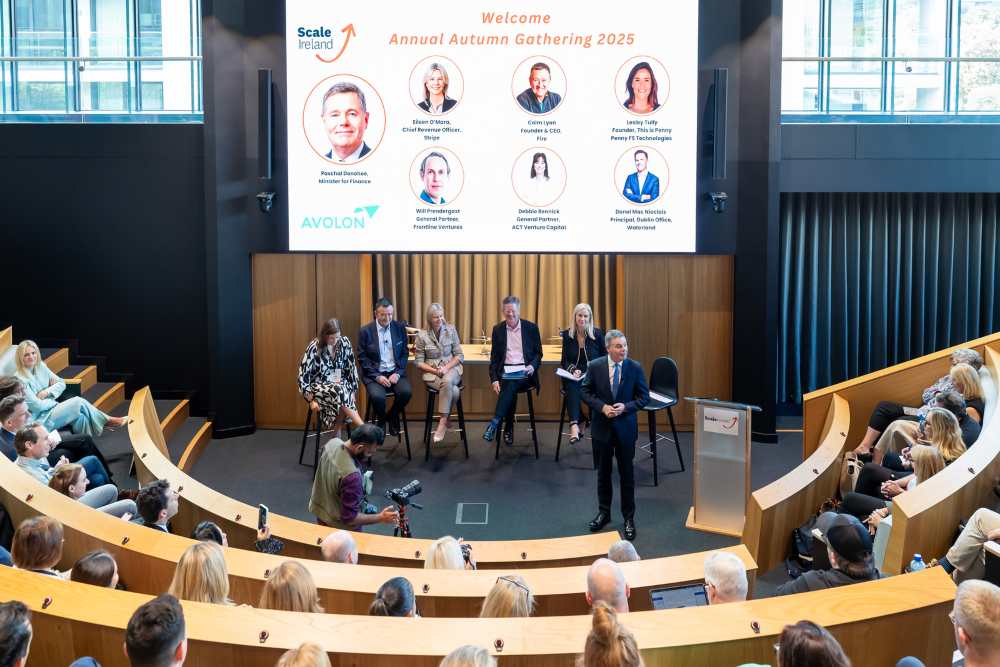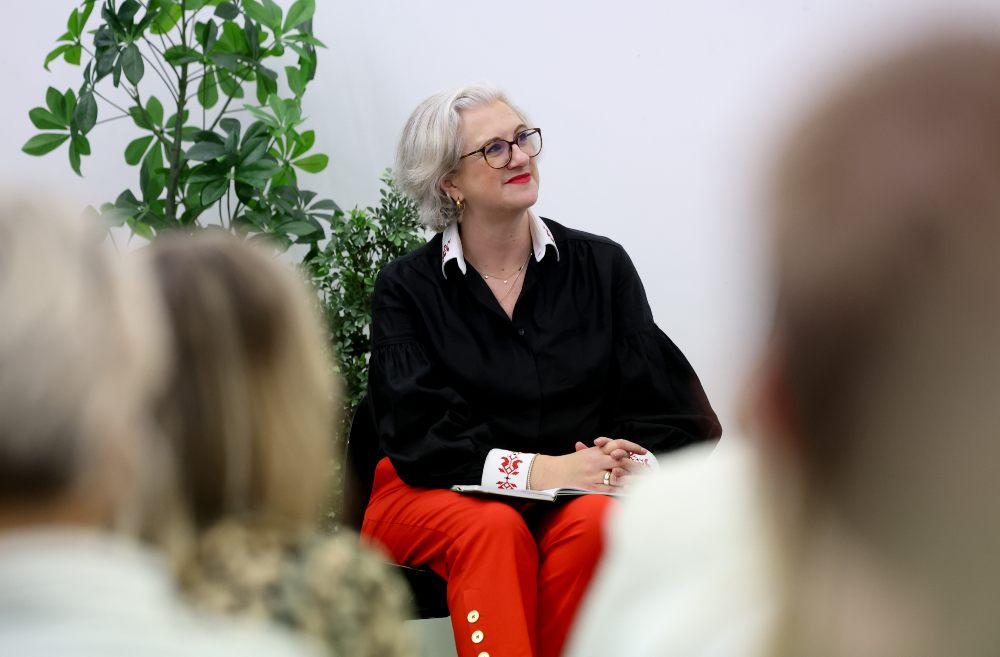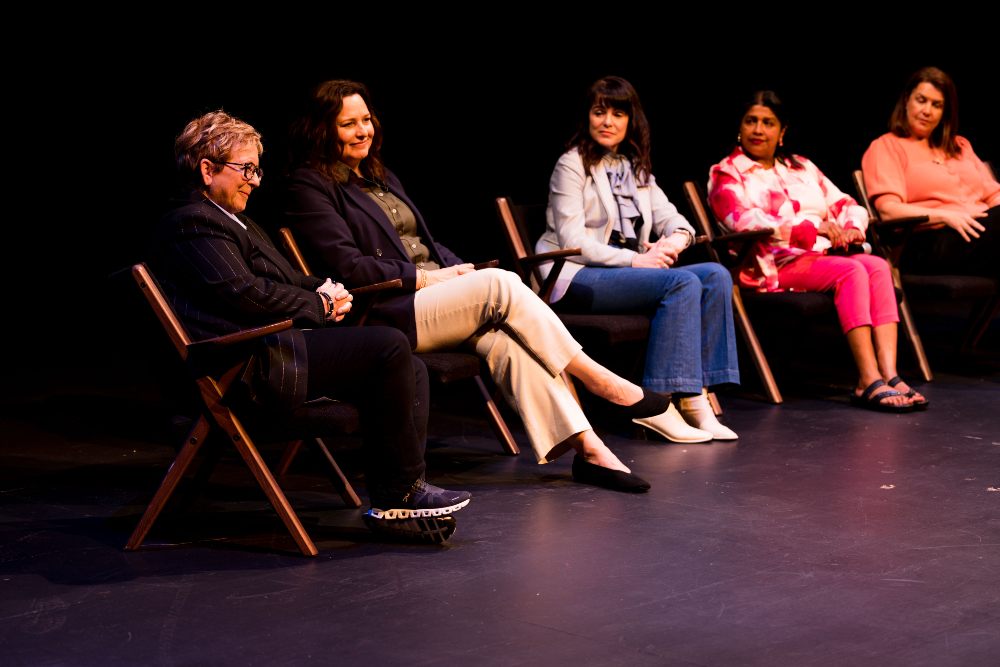If Ireland is serious about building a strong SME and scale-up economy, the “little by little” approach in successive Budgets is not enough. It is time for bold action and policy change.
About a decade ago, the notion of an Irish Minister for Finance even spending time talking candidly with an “entrepreneur” that didn’t come from somewhere like Silicon Valley with nice presents like a job creation press release and photo opps would have seemed opaque.
But yesterday (4 September) the Minister for Finance Paschal Donohoe TD sat with entrepreneurs and investors in Dublin and listened to their feedback at the Scale Ireland autumn gathering. And, while he didn’t reveal much about the looming Budget 2026, he suggested pension reform spurred by opportunities like auto-enrolment, could see the long sought after investment in venture capital by Irish pension funds one day become a reality. One day?
Getting Ministers for Finance to listen to Irish entrepreneurs is a feat that Scale Ireland CEO Martina Fitzgerald and chair Brian Caulfield have pulled off consistently at their autumn gatherings every year since 2020. It is working.
They know senior politicians don’t want to be hectored or lectured. Instead, measured, evidenced arguments and calm professionalism in private meetings with ministers and their officials have gained more ground in the form of some changes to EIIS and R&D tax credits. But more change, bigger change, is needed.
If you read the room at the Scale Ireland autumn gathering 2025, there is a looming sense that Irish venture capital funding levels are about to plunge even further, hastened by global investors investing more and more in fewer and fewer ventures in the technology de jour, AI. This could prove disastrous for Irish start-ups and exporting scale-ups at a sensitive time in their growth journey.
Not only that but the threat to Ireland’s success at foreign direct investment (FDI) ushered by Trump’s tariffs ought to focus minds. It does not mean big pharma or tech giants are going to dismantle their considerable investments any time soon, but should be a wake up call that this country has put too many eggs in too few baskets.
You don’t need to be an economic genius to work out that a large portion of the nation’s GDP comes from a tiny handful of multinationals. And yet SMEs – yes, our domestic businesses – employ more than 90% of Ireland’s workforce.
What Ireland needs is balanced economic growth long into the future. We’ve made big bold bets before – industrial and economic policy change through Sean Lemass and educational policy change through the likes of TK Whitaker – that are the very bedrock of Ireland’s current prosperity.
We need to do so again. The “little by little” nip tucks in successive Budgets aren’t going to cut the mustard, Paschal. Infrastructure is finally being tackled, but the nettle that must be grasped is putting our SMEs on an equal priority footing as those of our multinational investors.
Realpolitik for the real economy?
Minister for Finance Pascal Donohoe, TD
The strong themes thrown up at Scale Ireland’s Autumn 2025 gathering included the funding gap and access to capital, the regulatory complexity that start-ups, scale-ups and established SMEs must battle, the struggle to retain and incentivise talent and positioning the country to capitalise on the AI wave.
Martina Fitzgerald pointed out that Scale Ireland has seen its membership blossom to more than 800 members, making it the largest such SME organisation in Ireland.
She said the primary concern for founders remains funding access. She pointed recent government-commissioned report which identified a €1.1bn funding gap over the next 3-5 years, creating risks of companies relocating to follow available capital.
The event took place in the auditorium of aircraft lessor Avolon’s sumptuous offices in Ballsbridge where Ciara Ruane, the firms’ chief people officer, spoke movingly about how in the company’s early days 15 years ago, it faced an uphill battle to be taken seriously by anyone at home. Today it is one of the world’s largest aircraft lessors, demonstrating what Irish companies can achieve globally. She proved success requires not only hard work and vision, but the right operating environment and Government support.
“Engagement and culture don’t just happen, they need deliberate investment,” she said. “And I don’t just mean in people and career paths. It’s the ecosystem around that. It’s the foundation that builds trust.”
The Minister for Finance praised the resilience of Ireland’s economy and acknowledged the need to support innovation and entrepreneurship.
Donohoe acknowledged the complexity of current support schemes and the need to balance targeted support with accessibility. European Union compliance requirements contribute to complexity, he said, but added consultations are underway to address regulatory burdens while maintaining single market benefits.
The Finance Minister didn’t give much away, but enough to suggest something is happening. He highlighted the critical juncture in Ireland’s pension sector development, noting the correlation between well-developed national pension schemes and well-funded startup ecosystems observed in other countries.
He committed to considering pension fund reform, simplification of tax incentives, and targeted funding mechanisms in Budget 2026 and beyond.
No doubt he has his hands full with the €275bn National Development Plan and the enduring housing crisis that is hurting every segment of the country from people to businesses, but said there were “trade-offs” that have to be considered in the lead-up to every Budget.
“I have to be confident that whatever we do is something that we can afford, not only for 2026 but for the years after that. And I have to make a set of choices now regarding our overall tax policy that I’m in the process of doing so, whether it’s our R&D offering, whether it’s the funds that we have in place and the credits that we have in place to support innovation and scaling up. I am aware of your views, and I do want to recognise a particular issue that has been highlighted there by both Martina and Brian, which is the funding gap that a number of you are now facing, or maybe facing.
“I’m aware of the reports, not only that we have done as a Department, with the analysis that you have presented to us that is showing the emerging signs of a funding shortfall and the challenges that are there for a number of you, in getting the funding that you need to scale. We have shown a creative ability to respond back to that in the past, and again, it’s something that we’re going to practically going to have to consider. Not everything happens on Budget Day, not everything happens in a single Budget, but the issues that are being raised at the moment are ones that we’re aware of and we are giving attention to.”
A taste of what is possible
One of the greatest Irish success stories – not to technically come out of our country, but rather San Francisco – is payments giant Stripe, founded by Nenagh natives John and Patrick Collison. The company’s chief revenue officer Eileen O’Mara explained how the business now processes $1.4trn in payments annually – equal to 1.3% of global GDP – and employs 9,000 people globally, including 600 in Dublin.
O’Mara pointed to the disparities between Ireland and Silicon Valley. She said that 80% of US start-up capital comes from non-bank sources, while European founders often have to relocate to the US in order to access funding.
Culturally, US start-up founders receive “hero status” almost from day one with strong community support. Europe, she said, lacks similar entrepreneurial infrastructure and noted that while it takes a US business one day to start-up, it could take European businesses months to get established due to regulatory complexity and unnecessary red tape.
“The talent in Ireland, the companies in Ireland are shoulder to shoulder with anywhere else in the world, and we get to see companies all over the world. It is our intention to keep building global globally, and we’re very invested in that.”
She urged Ireland to leverage the AI and fintech waves. “We are spending a lot of our energy and time developing companies that are working with us to ride this wave and make sure they are set up for their future growth.”
One company riding the fintech wave is FIRE, a business founded by Colm Lyon who sold his previous company Realex to Global Payments. His business is processing payments approaching €1bn per month and works with 3,000 businesses in Ireland, the UK and across Europe.
Lyon expressed his concerns about Irish policy regarding indigenous firms, noting that while Ireland attracts international payment firms through Brexit and FDI, few indigenous firms can obtain financial services licenses.
He said that when he first started out as an entrepreneur BES (Business Expansion Scheme), the predecessor to EIIS, took just one phone call and one form to process. “The current incentives are too complex for many start-ups to utilise.”
Lyon also made a poignant point about how “heartbreaking” it is for business owners to struggle to retain people after investing in cultivating their skills only to lose them due to the competitive market for talent in Ireland.
The sense of endless hoops founders must jump through was amplified by Lesley Tully, founder of private pensions for women business This is Penny, who described the frustrations of being a founder. Her business, which addresses womens’ financial security, was inspired by her own mothers’ inability to access an Irish State pension.
Tully pointed out that there needs to be better risk-reward structures for early-stage investors. She said that entrepreneurs struggle to access systemic support and advisory resources. In her own case, despite spending thousands of her own savings on research, she was unable to access relevant tax credit benefits.
In response, Minister Donohoe said he heard “loud and clear” what the entrepreneurs were saying about regulatory complexity, especially in relation to EIIS and R&D tax credits.
It remains to be seen, however, if Budget 2026 will deliver what entrepreneurs spoke passionately about at the Scale Ireland event and if the eloquent and professional arguments put forward by Brian and Martina in their meetings with Government officials have been listened to and will be acted upon.
But one Budget at a time may not solve everything. Real and meaningful policy change that is cultural as much as it is fiscal with an impact that could resonate for decades for indigenous businesses is needed.
At a time of unprecedented global change, our chance to elevate our SMEs and put them on the same footing as our FDI investors requires another Sean Lemass or TK Whitaker moment.
-
Bank of Ireland is welcoming new customers every day – funding investments, working capital and expansions across multiple sectors. To learn more, click here
-
For support in challenging times, click here
-
Listen to the ThinkBusiness Podcast for business insights and inspiration. All episodes are here. You can also listen to the Podcast on:
-
Spotify
-
SoundCloud
-
Apple







